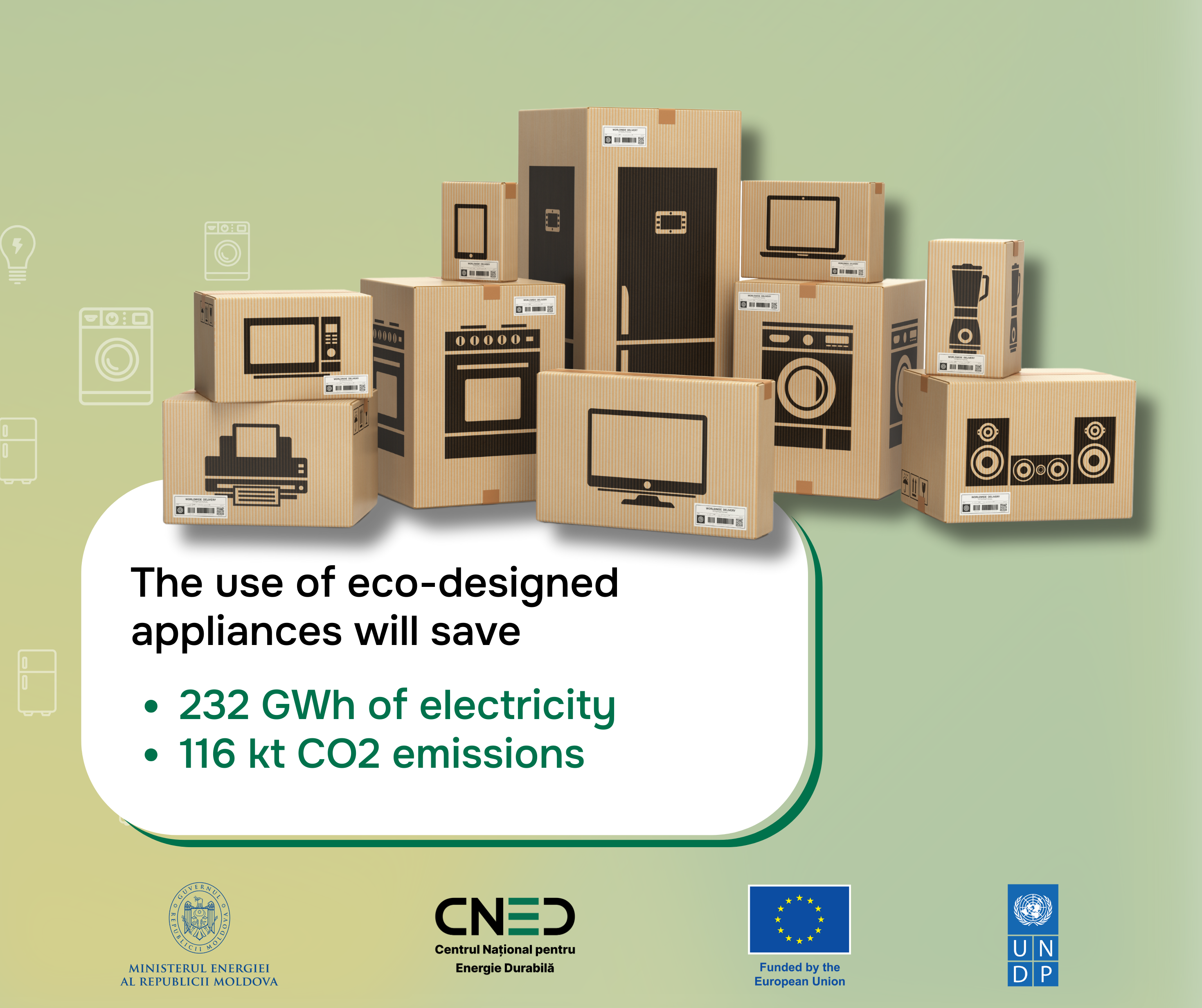Domestic appliances sold in Moldova will have to comply with new technical standards transposing EU regulations in this field
November 13, 2024

The Government has approved on 13 November 2024 eco-design requirements for 21 types of energy-related products. The requirements were developed with the support of the EU-funded “Addressing the impacts of the energy crisis in Moldova” programme, implemented by UNDP Moldova.
The requirements cover 21 of the 29 types of products regulated in the European Union, ranging from light sources, refrigerators, heating installations, ventilation, boilers, computers and computer servers. Imports of these products are growing and with them energy consumption in households and businesses. In 2023 alone, imports of appliances and equipment for telecommunications and for sound and image recording and reproduction have increased by more than 25%, and by more than 14% - the imports of electrical machinery and appliances.
Thus, household energy consumption accounts for almost half of final energy consumption and household appliances are responsible for almost 70-80% of this consumption. In the absence of regulations similar to those in the European Union, there is an increased risk that non-compliant and less energy-efficient products will be directed to the Moldovan market, given that all energy-intensive products placed on the market in Moldova are imported.
Compliance with ecodesign requirements is important because when energy-intensive products consume more energy (including water and other resources) than was expected based on the figures declared on the energy label, the unexpected consumption creates an additional burden on the national economy. This is at a time when Moldova still has a higher energy intensity than most countries in South-Eastern Europe, 18.32 GJ/1000$ at 2015 parity, i.e. for every thousand dollars of Gross Domestic Product in the country 18.32 GJ of energy are spent.
The reduction of irrational energy consumption will help to reduce household energy bills, but also to achieve the country's decarbonization goals, i.e. to reduce greenhouse gas (GHG) emissions to net zero by 2050. According to estimates, the application of eco-design requirements will generate annual savings of about 232 GWh in final energy consumption and associated CO2 emission reductions of about 116 ktonnes annually. The calculations were made by comparing the GDP of the Republic of Moldova (USD 14.5 billion in 2022) to that of the European Union (USD 16.6 trillion in 2022), and extrapolating the energy savings by using energy-efficient equipment in a 1 to 1000 ratio.
Ecodesign is a product design concept that aims to reduce the overall environmental impact of a particular product in various ways. It can include discrete innovations, such as the placement of the on/off button on the TV, thus making it easier or more difficult to unplug the TV and saving energy, or simple aspects, such as the metals contained or the way in which different components of the used product can be recycled.
Environmental performance and energy efficiency can be improved by including environmental aspects at one of the earliest stages of product creation, and at the heart of eco-design is the concept of the product life cycle, which starts with the extraction of resources from nature, continues with the production of materials and product/component manufacturing processes, the use and maintenance of a product, and ends at the end-of-life stage (the "cradle-to-grave" approach).
The EU Ecodesign legislative framework has been partially adopted in the Republic of Moldova and only 18 out of 29 implementing Regulations are in force, but some of them transpose old versions or have been repealed.


The new Regulations apply to the following types of energy-related products:
- light sources and separate control devices;
- electric motors and variable speed drives;
- household dishwashing machines;
- household washing and drying machines;
- external power supplies;
- refrigerating appliances;
- electronic displays;
- household ovens, cookers, hobs and kitchen hotels;
- local heating appliances;
- appliances for space heating with solid fuel;
- professional refrigerated storage cabinets, refrigerated blast chilling and freezing cabinets, condensing units and process chillers;
- small, medium and large power transformers;
- welding equipment;
- direct-selling refrigerating appliances;
- computers and computer servers;
- ventilation units;
- solid fuel boilers;
- air heating products, cooling systems, industrial high temperature chillers and fan coils;
- servers and data storage products;
- smart phones, other cell phones, cordless phones and slate-type tablets.
- water heating installations and hot water tanks.
The State Inspectorate for the Supervision of Non-Food Products and Consumer Protection will check the compliance of energy-related products with the accompanying documents. In this regard, the “Addressing the impacts of the energy crisis in the Republic of Moldova” programme has organized trainings for the inspectors of the institution on energy labeling and ecodesign.

 Locations
Locations



